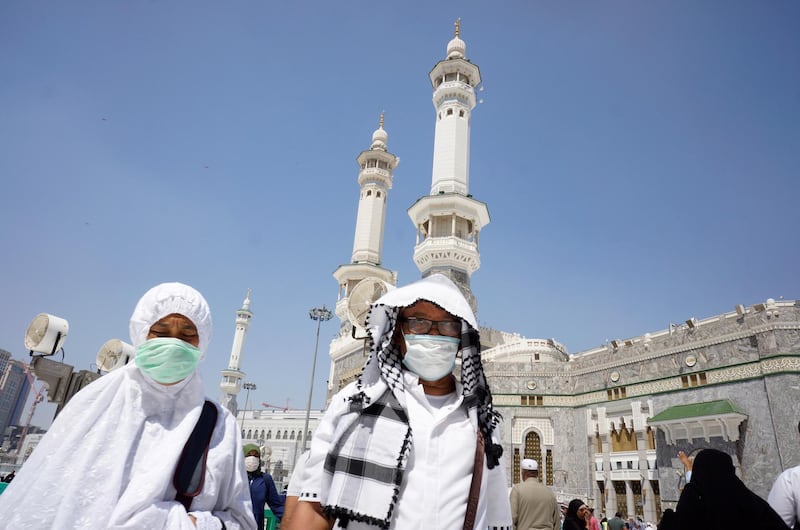Saudi Arabia, home of Islam's most holy sites, has announced an unprecedented move to suspend prayers at mosques throughout the country to help contain the spread of coronavirus.
Makkah and Madinah are exempt and will continue offering prayers, the state-run Saudi Press Agency said.
The two holy sites were previously closed, but partially reopened following a royal decree, however pilgrimages have been halted due to the virus.
Mosques will close their doors temporarily but continue to issue the ritual call to prayer, which will direct people to pray in their homes rather than come to the mosque.
Islamic Affairs Minister Abdulatif Al Sheikh told state television that facilities for washing the dead at mosques that have them would remain open but access would be restricted to a few people. Praying over the dead will only be permitted at the cemetery, not in the mosque, he added.
Saudi Arabia's health ministry announced 38 news cases of the virus on Tuesday, bringing the total number of infections to 171 and no deaths. The country has taken drastic measures to combat the spread, including halting all international flights, closing restaurants and closing most public establishments.
The new cases are a mix of Saudi and foreign nationals, who arrived from abroad. They have been isolated in health facilities in Jeddah, Qatif, Riyadh, Dhahran and Makkah.
Iran, the worst affected country in the Middle East, issued its most dire warning yet about the viral outbreak, suggesting “millions” could die in the Islamic Republic if people keep traveling and ignoring health guidance.
A state television journalist who also is a medical doctor gave the warning only hours after hard-line Shiite faithful on Monday night pushed their way into the courtyards of two major shrines that had finally been closed due to the virus. Supreme Leader Ayatollah Ali Khamenei issued a religious ruling prohibiting “unnecessary” travel in the country.
Roughly 9 out of 10 of the over 18,000 confirmed cases of the virus in the Middle East come from Iran, where authorities denied for days the risk the outbreak posed. Officials have now implemented new checks for people trying to leave major cities before Nowruz, the Persian New Year, on Friday, but have hesitated to quarantine the areas.
That’s even as the death toll in Iran saw another 13 per cent increase on Tuesday. Health Ministry spokesman Kianoush Jahanpour said the virus had killed 135 more people to raise the total to 988 amid over 16,000 cases. Jordan prepared for a shutdown of its own, banning gatherings of more than 10 people, and neighboring Israel issued its own strict guidelines.
Most infected people experience only mild or moderate symptoms, such as fever and cough, and recover within weeks. But the virus is highly contagious and can be spread by people with no visible symptoms. For some, especially older adults and people with existing health problems, it can cause more severe illness, including pneumonia.
Egypt, which has 166 confirmed cases of the new virus including four deaths, announced the immediate shutdown of all movie theatres across the country until further notice.
Jordan deployed troops outside of major cities to block travel. It also ordered newspapers to cease publishing, banned gatherings of more than 10 people and established a quarantine zone at Dead Sea hotels. It halted all private sector work and public transportation as well.
Oman announced anyone coming from abroad would be subject to quarantine.
Israel’s Defence Ministry plans to use near-empty hotels, ravaged by the crash in tourism, as recovery centres for patients diagnosed with COVID-19, the illness caused by the virus. Israel also called on citizens to stay home, closing parks, museums, libraries, beaches and other public areas.
In Syria, all sports clubs, movie theatres, concerts, theatres, as well as halls used for weddings or funerals were ordered closed in the capital of Damascus, and all restaurants and other shops around the country were ordered closed. Syria says it has no cases of the virus so far.
Pakistan’s suffered its first death as the number of coronavirus cases jumped to 236. Government critics say thousands of pilgrims were not properly screened as they arrived from Iran at the southwestern Taftan border earlier this month.
Western and Arab countries in a statement on Tuesday urged Libya's warring factions to stop fighting to allow the country's authorities to respond to the threat posed by the coronavirus.
Although Libya has yet to record any confirmed cases, the World Health Organisation representative in Tripoli has warned of the great risks faced if the virus spreads in a country fragmented by conflict.
For the last year, the eastern-based Libyan National Army and Tripoli-based Government of National Accord have been clashing.
The LNA is backed by the United Arab Emirates, Egypt and Russia while the GNA is supported by Turkey. In recent weeks numerous rounds of bombardment have targeted GNA-held areas around Tripoli including around its last functioning airport.
A joint statement on Tuesday from Algeria, Britain, France, Germany, Italy, the Netherlands, the United States, the European Union, Tunisia and the United Arab Emirates said a truce would help efforts to tackle the virus.







